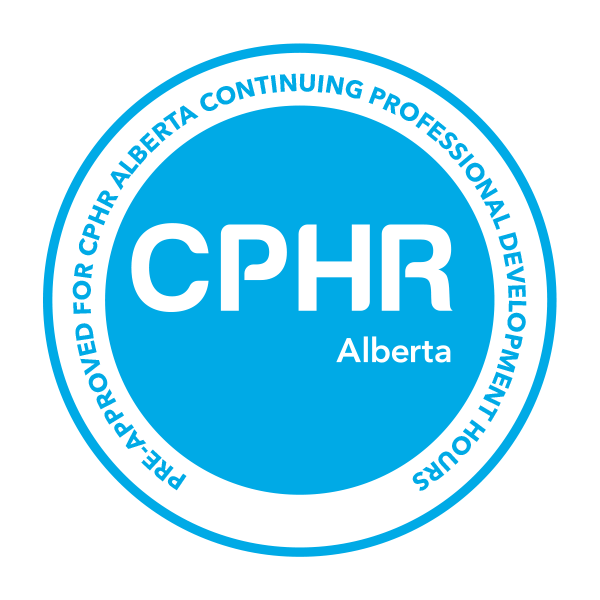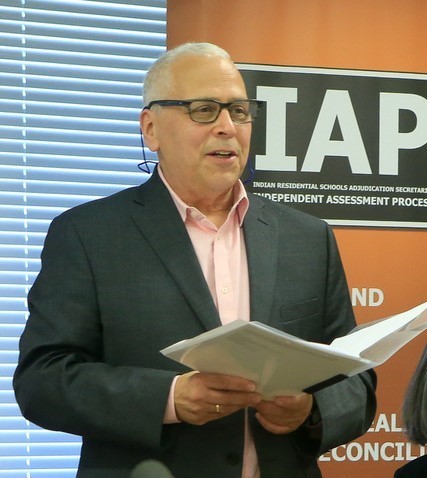Sponsored by:

Conference Co-Chairs
Kelly Williams-Whitt
Arbitrator/Mediator and Dean
Faculty of Business and Communication Studies Mount Royal University
Conference Advisory Committee
Monday, June 26, 2023
Pre-Conference Workshop Schedule
Breakfast and Registration
8:00 a.m. – 9:00 a.m. MT
Introductory Remarks
9:00 a.m. – 9:10 a.m. MT
Session 1
9:10 a.m. – 10:25 a.m. MT
Break
10:25 a.m. – 10:40 a.m. MT
Session 2
10:40 a.m. – 11:55 a.m. MT
Lunch
11:55 a.m. – 1:05 p.m. MT
Session 3
1:05 p.m. – 2:20 p.m. MT
Break
2:20 p.m. – 2:35 p.m. MT
Session 4 and closing remarks
2:35 p.m. – 4:00 p.m. MT
*Workshops sold separately from stand-alone conference.
Pre-Conference Workshops (Choice Of 1 Of 3)
Difficult Accommodations: Responding to denial, defensiveness, and personality disorders
David Lardner
Union Representative, Disputes and Arbitration
Alberta Union of Provincial Employees (AUPE)
Accommodating employees with disabilities that impair their judgment, perception, and ability to cooperate can be challenging. Unfortunately, mental health disabilities, such as mood disorders, can often impact the very abilities necessary for an individual to engage in the accommodation process.
Working through interactive exercises and realistic scenarios with the guidance of experts, participants will develop the knowledge and skills necessary to:
- Develop an understanding of how common disabilities may impede a worker’s ability to participate in the accommodation process
- Demonstrate effective communication skills when interacting with resistant or uncooperative employees
- Understand responsibilities surrounding the duty to inquire, obtaining medical records, and related privacy legislation
- Comply with union and management legal obligations when workers are unwilling or unable to participate in the accommodation process
- Identify when the threshold of undue hardship is reached
Before and After the Investigation: Preventing conflict, restoring relationships
When it comes to workplace investigations, prevention is often better than cure. Developing workplace policies and procedures that promote informal resolution methods may minimize an employer’s need to launch a formal investigation. Where circumstances demand a formal investigation, however, workplace parties play a critical role in subsequent restoration efforts.
In this skills-based session, participants will develop a comprehensive understanding of the following:
- Documenting workplace incidents and engaging in progressive discipline to manage interpersonal conflict
- Implementing trauma-informed strategies for addressing allegations of discrimination or harassment in the workplace
- Developing respectful workplace policies, anti-harassment policies, and anti-discrimination policies, and adequately monitoring these policies for effectiveness
- Resolving workplace conflict through informal resolution methods such as mediation, coaching, or management intervention, before launching a formal investigation
- Restorative processes that repair workplace culture after a formal investigation occurs
- Providing sensitivity training to workplace parties to improve working relationships
Impairment at Work: Identifying causes, addressing risks, providing accommodation
Dr. Charl Els
Addiction Psychiatrist, Occupational Physician and Clinical Professor
Department of Psychiatry/Department of Medicine
University of Alberta
Employers, employees, and unions are responsible for addressing impairment in the workplace. Navigating what constitutes impairment, recognizing substance abuse, and developing effective workplace policies and procedures for addressing impairment can present numerous complexities. This session is designed as a step-by-step guide to help parties collaborate in developing policies, procedures, and substance use accommodations that ensure a safe and healthy workplace.
Legal and technical experts will guide participants through an interactive, engaging session. Participants will leave this session with an understanding of key issues, including the following:
- What constitutes impairment
- How to identify the causes and symptoms of impairment
- What to consider in determining whether an employee has a substance use disorder
- How employers and unions should handle the risks of impairment
- How to develop workplace policies and procedures that address impairment
- When and how employers should provide accommodation for substance use disorders, and the union’s role in the accommodation process
- Whether employers can mandate treatment, and employee obligations to seek treatment
Conference
Check back soon for details
Less than six months after the public launch of ChatGPT, artificial intelligence (AI) is making a big splash in labour relations. Thousands of striking television and movie writers are demanding that restrictions on the use of AI be included in their new contract. While fears about automation killing jobs are nothing new, current iterations of AI are raising concerns about white collar work and about the processes of labour and employment relations themselves. Join a panel of experts to explore the impact AI will have on labour relations in the near future including:
- Will human resources professionals be helped by AI or replaced by it?
- Will union representatives be helped, hindered, or replaced by AI?
- What are the potential uses and abuses of “algorithmic management,” which is defined as delegating to algorithms certain managerial tasks such as filtering through applications for employment, assessing employee performance, or even making decisions regarding termination of employment?
- What role will AI play in key labour relations processes, such as arbitration, collective agreement interpretation, and negotiation of collective agreements?
- How, if at all, should unions and employers use collective bargaining to address the potential impact of AI on jobs? In what sectors would collective agreement language addressing AI be most important?
Tuesday, June 27, 2023
Breakfast: 8:00 a.m. – 8:45 a.m. MT
Notable and Newsworthy: Major caselaw and legislative developments
This session will cover major caselaw and legislative updates from Alberta and across Canada. Experts will provide summaries and insight into the latest and most noteworthy cases, while also discussing general trends. Topics to be covered include remote work, substance abuse and drug testing, privacy and surveillance, discipline, harassment, discrimination, and accommodation. Legislative updates will include both provincial and federal developments. Final selection of topics takes place in the weeks leading up to the conference, ensuring coverage of the latest and most important developments.
Break: 10:00 a.m. – 10:15 a.m. MT
Beliefs and Boundaries: Reconciling employee free speech and employer concerns
Is it appropriate for workplaces to monitor and impose disciplinary action on employees for off-duty and online behavior? Can policies that govern off-duty conduct be justified by the need to promote a respectful workplace? In this panel, experts will explore employer and union responsibilities in ensuring appropriate employee conduct, both inside and outside the workplace. Specifically, panelists will address:
- Can an employer impose restrictions on off-duty conduct, expression, and political activity? Is the nature of the workplace relevant?
- What is the threshold for determining whether an employee’s off-duty conduct has a sufficient connection to the workplace? When does an employee’s right to express personal opinions outside the workplace become a legitimate concern for an employer?
- In what circumstances, if any, is it appropriate for an employer to monitor an employee’s social media accounts? Must an employer hold a reasonable suspicion of misconduct to institute monitoring?
- What disciplinary measures have arbitrators deemed appropriate for off-duty misconduct?
- What key provisions should workplace policies and collective agreements contain to address inappropriate off-duty conduct?
Break: 11:20 a.m. – 11:35 a.m. MT
Concurrent Session – Block 1
Pick 1 of 3: 11:35 a.m. – 12:35 p.m. MT
Breaking the Impasse: Key issues in interest arbitration
In this session, seasoned experts will address key issues in interest arbitration, lending insight into perennial principles, providing practical guidance on procedural issues, and examining trends in recent arbitration awards. Panelists will address questions including:
- What principles and criteria will interest arbitrators consider in crafting an award? What do recent cases suggest about how arbitrators will apply the principles of replication, demonstrated need, and total compensation?
- Under what circumstances will the Alberta Labour Relations Board order first contract arbitration? How have amendments to the Labour Relations Code resulting from Bill 32, the Restoring Balance in Alberta’s Workplaces Act, affected the threshold for intervention?
- What authority does the Alberta Labour Relations Board have when parties with a prior collective agreement are unable to reach a subsequent agreement through collective bargaining? When can the Board order parties to engage in interest arbitration? Is the analysis different if the parties provide essential services?
- In recent awards, how have concerns such as inflation, the employer’s ability to pay, and recruitment and retention issues impacted the determination of whether wage adjustments were warranted?
- What are the advantages and disadvantages of med-arb, arb-med, or final offer selection, and when may such approaches be appropriate?
The Pandemic’s Lasting Legacy: What COVID-19 has taught us about labour relations
Throughout the pandemic, arbitrators, courts, and workplace parties have grappled with the challenge of applying established labour relations principles in the face of unprecedented circumstances. In this session, expert panelists will reflect on lessons learned from this tumultuous time, critically evaluating recent cases and exploring best practices for the future. Questions to be addressed include:
- What guidance do cases decided in the COVID-19 context provide regarding when courts and arbitrators will uphold precautionary and safety-based workplace measures such as mandatory vaccination? What measures can employers take when employees refuse vaccination? What measures are beyond permissible bounds?
- As COVID-19 case counts decline, will mandatory workplace vaccination policies continue to be upheld? Must employers review their policies, and if so, what processes should they follow?
- How have courts and arbitrators applied the Supreme Court of Canada test in Syndicat Northcrest v. Anselem when assessing religious accommodations in the workplace during COVID-19? How are religious beliefs distinguished from political beliefs, and how is the sincerity of those beliefs assessed?
- What do recent cases suggest about how arbitrators will assess the exercise of management rights under uncertain or extraordinary circumstances?
- With many workplaces having shifted to a remote or hybrid model during the pandemic, can employers now require employees to return to work?
- How, if at all, did COVID-19 exacerbate, ameliorate, or expose existing workplace inequities?
- What “gaps” in workplace policies and collective agreements have been revealed during the pandemic? What steps should workplace parties now be taking to prepare for potential future pandemics or similarly disruptive events?
Digital Overreach: Can existing privacy laws stop unreasonable surveillance and monitoring?
Advances in technology and the dramatic shift to remote work due to COVID-19 have given rise to a significant interest in digital surveillance of employees. Meanwhile, privacy legislation has remained largely static. In an era of big data and artificial intelligence, are existing privacy laws up to the task of balancing employers’ interests in productivity and efficiency and employees’ interests in autonomy and a private life? In this session, leading experts will tackle this question as well as the following:
- What constitutes collection of “personal employee information” for “reasonable” purposes permitted under current privacy laws in Alberta?
- How do the privacy rights of job applicants differ from the rights of existing employees? Under current laws, would an employer be permitted to use software to construct a personality profile of job applicants based on their internet activity?
- Do current interpretations of the reasonableness requirement appropriately balance employer interests in managing work and employee privacy rights? Do new technologies, or new uses of technologies, threaten the established balance?
- Is the use of algorithmic management, in which algorithms make important employment decisions based on extensive data on employees at work, a privacy issue or a management rights issue?
- How much say do unions and their members currently have in what employee information employers collect and how it is used? How do collective agreement provisions address this issue? Is the status quo in need of change? If so, why and how?
- Are conceptions of privacy held by most employees at odds with those held by employers and/or those that underlie privacy legislation? If so, is this a problem? If it is, how should it be remedied?
Lunch: 12:35 p.m. – 1:45 p.m. MT
Concurrent Session – Block 2
Pick 1 of 3: 1:45 p.m. – 2:45 p.m. MT
Breaking the Impasse: Key issues in interest arbitration
In this session, seasoned experts will address key issues in interest arbitration, lending insight into perennial principles, providing practical guidance on procedural issues, and examining trends in recent arbitration awards. Panelists will address questions including:
- What principles and criteria will interest arbitrators consider in crafting an award? What do recent cases suggest about how arbitrators will apply the principles of replication, demonstrated need, and total compensation?
- Under what circumstances will the Alberta Labour Relations Board order first contract arbitration? How have amendments to the Labour Relations Code resulting from Bill 32, the Restoring Balance in Alberta’s Workplaces Act, affected the threshold for intervention?
- What authority does the Alberta Labour Relations Board have when parties with a prior collective agreement are unable to reach a subsequent agreement through collective bargaining? When can the Board order parties to engage in interest arbitration? Is the analysis different if the parties provide essential services?
- In recent awards, how have concerns such as inflation, the employer’s ability to pay, and recruitment and retention issues impacted the determination of whether wage adjustments were warranted?
- What are the advantages and disadvantages of med-arb, arb-med, or final offer selection, and when may such approaches be appropriate?
The Pandemic’s Lasting Legacy: What COVID-19 has taught us about labour relations
Throughout the pandemic, arbitrators, courts, and workplace parties have grappled with the challenge of applying established labour relations principles in the face of unprecedented circumstances. In this session, expert panelists will reflect on lessons learned from this tumultuous time, critically evaluating recent cases and exploring best practices for the future. Questions to be addressed include:
- What guidance do cases decided in the COVID-19 context provide regarding when courts and arbitrators will uphold precautionary and safety-based workplace measures such as mandatory vaccination? What measures can employers take when employees refuse vaccination? What measures are beyond permissible bounds?
- As COVID-19 case counts decline, will mandatory workplace vaccination policies continue to be upheld? Must employers review their policies, and if so, what processes should they follow?
- How have courts and arbitrators applied the Supreme Court of Canada test in Syndicat Northcrest v. Anselem when assessing religious accommodations in the workplace during COVID-19? How are religious beliefs distinguished from political beliefs, and how is the sincerity of those beliefs assessed?
- What do recent cases suggest about how arbitrators will assess the exercise of management rights under uncertain or extraordinary circumstances?
- With many workplaces having shifted to a remote or hybrid model during the pandemic, can employers now require employees to return to work?
- How, if at all, did COVID-19 exacerbate, ameliorate, or expose existing workplace inequities?
- What “gaps” in workplace policies and collective agreements have been revealed during the pandemic? What steps should workplace parties now be taking to prepare for potential future pandemics or similarly disruptive events?
Digital Overreach: Can existing privacy laws stop unreasonable surveillance and monitoring?
Advances in technology and the dramatic shift to remote work due to COVID-19 have given rise to a significant interest in digital surveillance of employees. Meanwhile, privacy legislation has remained largely static. In an era of big data and artificial intelligence, are existing privacy laws up to the task of balancing employers’ interests in productivity and efficiency and employees’ interests in autonomy and a private life? In this session, leading experts will tackle this question as well as the following:
- What constitutes collection of “personal employee information” for “reasonable” purposes permitted under current privacy laws in Alberta?
- How do the privacy rights of job applicants differ from the rights of existing employees? Under current laws, would an employer be permitted to use software to construct a personality profile of job applicants based on their internet activity?
- Do current interpretations of the reasonableness requirement appropriately balance employer interests in managing work and employee privacy rights? Do new technologies, or new uses of technologies, threaten the established balance?
- Is the use of algorithmic management, in which algorithms make important employment decisions based on extensive data on employees at work, a privacy issue or a management rights issue?
- How much say do unions and their members currently have in what employee information employers collect and how it is used? How do collective agreement provisions address this issue? Is the status quo in need of change? If so, why and how?
- Are conceptions of privacy held by most employees at odds with those held by employers and/or those that underlie privacy legislation? If so, is this a problem? If it is, how should it be remedied?
Break: 2:45 p.m. – 3:00 p.m. MT
Potholes on the Road to Justice: Addressing delay, abuse of process, and undue legalization in arbitration
Arbitration procedures have evolved significantly in recent years. Parties and practitioners have raised concerns about judicialization, timeliness of the process, difficulties in selecting arbitrators, and the ability to address abuses of process effectively. In this panel, experts will address the following:
- What common bottlenecks do parties encounter in the arbitral process? How can labour practitioners eliminate unnecessary delays?
- Does the growing legalism of arbitration undermine its unique advantages, or is it necessary to ensure procedural protections for parties?
- What options exist outside of the conventional arbitration process? In what circumstances should parties consider these alternatives?
- Should workplace parties consider creating unique expedited arbitration systems akin to the dispute resolution model between Canadian Railways and their unions?
- Can parties reduce arbitration timelines by participating in a virtual format? Is there room to automate arbitration processes by using artificial intelligence?
- How are new arbitrators trained and selected? How can parties be encouraged to select newer and more diverse arbitrators?
- What enhancements could be implemented to improve arbitration processes and outcomes?
End of Conference: 4:15 p.m. MT

This program has been approved by CPHR Alberta for 7.35 Continuing Professional Development hours.
- This program has been approved by CPHR BC & Yukon for 7.35 Continuing Professional Development hours.
- This program has been approved by the Law Society of Saskatchewan for 7.5 Continuing Professional Development hours.
- This program has been approved by the Law Society of British Colombia for 7.35 Continuing Professional Development hours.

The Pre-Conference workshops have been approved by CPHR Alberta for 5.5 Continuing Professional Development hours.
- The Pre-Conference workshops have been approved by CPHR BC & Yukon for 5.5 Continuing Professional Development hours.
- The Pre-Conference workshops have been approved by the Law Society of Saskatchewan for 5.5 Continuing Professional Development hours.
- The Pre-Conference workshops have been approved by the Law Society of British Colombia for 5.5 Continuing Professional Development hours.













































